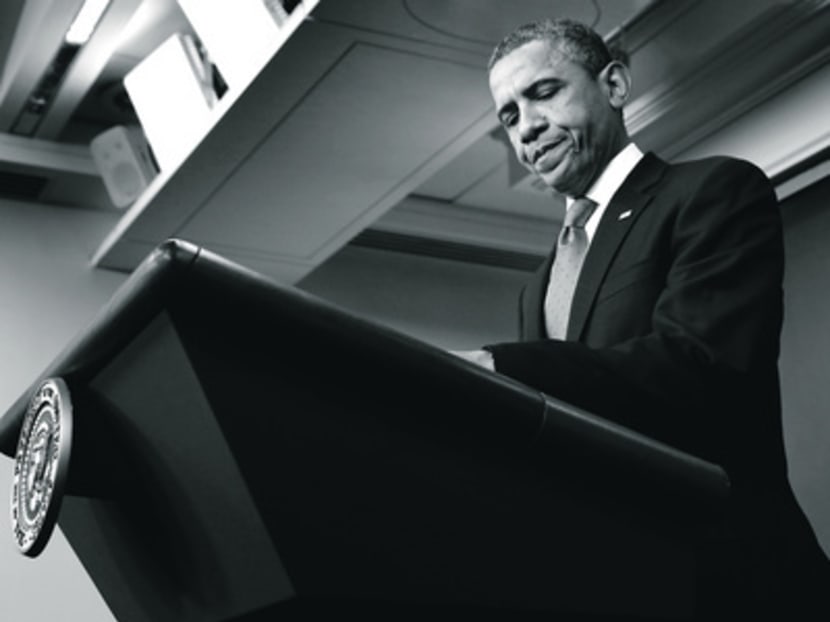The problem with kicking the can down the road
The United States fiscal cliff — an end-of-year deadline for automatic federal tax increases and across-the-board spending cuts, set by leaders frustrated by their own inability to fix America’s budget problems — has been averted.

US President Barack Obama may have obtained a fiscal deal that he could live with, but his administration must now begin to prepare itself for ‘March Madness’ — the debate over the debt ceiling. Photo: Reuters
The United States fiscal cliff — an end-of-year deadline for automatic federal tax increases and across-the-board spending cuts, set by leaders frustrated by their own inability to fix America’s budget problems — has been averted.
That is good news in the short term, because the fiscal cliff plan threatened to push the country back into recession. The trouble is, not much really got solved.
There are several ways of looking at the fiscal cliff deal that passed this week. From a policy perspective, all the big issues were left for another day. There is no agreement on raising the debt ceiling, heading off the threat of a government shutdown and reaching long-term debt stabilisation.
The ageing baby boom population means surging costs for entitlement programmes such as Social Security and Medicare, and record amounts are being spent on the military while major US involvements are winding down. Yet serious discussion about cost-containment and spending cuts is not happening.
MARCH MADNESS
From an economics perspective, the question of how Americans pay for what they want remains unanswered.
The fiscal cliff deal locks into place most of the Bush-era tax cuts — taxes go up on incomes above US$450,000 (S$550,000) for only about one half of 1 per cent of the population instead of 2 per cent — and permanently locks in low rates for the estate tax and capital gains tax.
No one wants to talk about the structural gap between the revenues the government takes in and the cost of programmes and services that the American people expect.
From a political perspective, President Barack Obama can say he prevented permanent tax cuts for the very wealthiest Americans.
But liberals are angry that all but the highest-income Americans get permanent tax breaks, conservatives are angry that the fiscal cliff plan fails to impose spending cuts that they themselves cannot seriously identify, and the deficit hawks are angry that someone else did not figure out what to do about the nation’s borrowing habits.
So the deal just buys some time — the pundits already are calling the next debate over the debt ceiling March Madness.
POLITICAL WRANGLING
Kicking the can down the road means the nation’s budget problems will have to be addressed, and soon, without any groundwork made on how to reach agreement. That is the more fundamental problem.
The pattern of deferring and delaying the hard work of governing exacts its own price.
The kind of political wrangling that used to come around at election cycles has kicked into permanent mode, and the price is failed leadership and dysfunction.
There are serious problems facing the country that need to be addressed by serious leaders.
They include controlling the runaway costs of healthcare — perhaps looking to other industrialised countries that have figured out how to deliver healthcare in an efficient, affordable way.
They also involve the runaway costs of Social Security and Medicare — containing costs for Medicare and raising the retirement age for full Social Security benefits.
Gutting those programmes, as right-wing budget zealots like Mr Paul Ryan want, is not going to pass muster with the American people.
MOVING PAST GRIDLOCK
Washington might take the lead on climate change, and what to do about rising sea levels, how to mitigate damage sure to be wrought by the next Hurricane Sandy — and how does the country pay for measures that need to be taken?
A carbon tax may be necessary, but we do not hear much talk about that from Washington.
They might be taking a serious look at the causes of the worst fiscal crisis since the Great Depression and the extent to which the US response has worked — fiscal stimulus, spending the way out with investments in public infrastructure, education, research and development.
They might also look at the causes of stagnating wages and the toll of growing income inequality, without succumbing to the usual partisan posturing.
Those issues will not get serious consideration until there is a more fundamental discussion than what we are getting now.
A national conversation, and something approaching a national consensus, is needed to move past political gridlock.
America is a divided country. There are increasingly shrill voices of the Tea Party and anti-tax activists such as Mr Grover Norquist, who believe government is too big and want it to shrink.
Yet no one — on the left or the right — wants to cut the big drivers of government spending: The military, Social Security and Medicare.
Until Americans find common ground on what they expect from government and how to pay for it, they will continue to wage petty battles with themselves and lose sight of the bigger picture.
Tom Benner is a freelance journalist who covers public policy, culture and business. Before relocating to Singapore, he served as bureau chief in the Massachusetts State House and as a long-time editorial writer for daily newspapers in the US.






